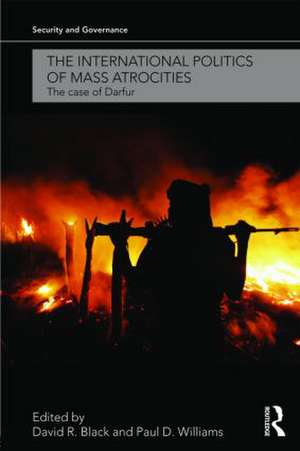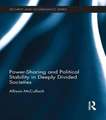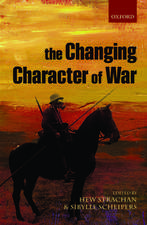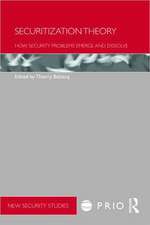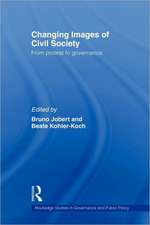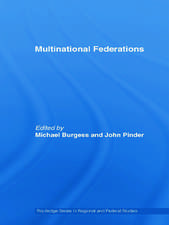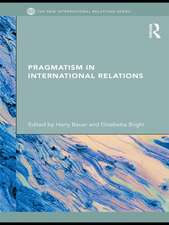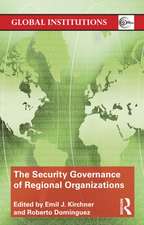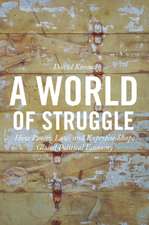The International Politics of Mass Atrocities: The Case of Darfur: Security and Governance
Editat de David R. Black, Paul D. Williamsen Limba Engleză Paperback – 16 dec 2009
This book examines the crisis in Darfur as a case study of some of the wider debates currently taking place within International Relations theory. Using the conceptual framework developed by English School theorists, specifically their concept of international society and the related idea of "good international citizenship", this book examines a wide range of issues: foreign policy analysis, theories of norm diffusion, international organizations, peace operations, international criminal justice and war law, the causes and nature of contemporary warfare, and the international relations of Africa.
Making an important contribution to the debate about the meaning and limits of international society, this book will be of interest to students and scholars international relations theory, international security, foreign policy, international organizations, human rights, African politics, genocide studies and international law.
| Toate formatele și edițiile | Preț | Express |
|---|---|---|
| Paperback (1) | 448.86 lei 6-8 săpt. | |
| Taylor & Francis – 16 dec 2009 | 448.86 lei 6-8 săpt. | |
| Hardback (1) | 1117.43 lei 6-8 săpt. | |
| Taylor & Francis – 4 ian 2010 | 1117.43 lei 6-8 săpt. |
Preț: 448.86 lei
Nou
Puncte Express: 673
Preț estimativ în valută:
85.89€ • 89.68$ • 70.92£
85.89€ • 89.68$ • 70.92£
Carte tipărită la comandă
Livrare economică 15-29 aprilie
Preluare comenzi: 021 569.72.76
Specificații
ISBN-13: 9780415559034
ISBN-10: 0415559030
Pagini: 288
Ilustrații: 2 b/w images, 1 table and 2 line drawings
Dimensiuni: 156 x 234 x 19 mm
Greutate: 0.44 kg
Ediția:New.
Editura: Taylor & Francis
Colecția Routledge
Seria Security and Governance
Locul publicării:Oxford, United Kingdom
ISBN-10: 0415559030
Pagini: 288
Ilustrații: 2 b/w images, 1 table and 2 line drawings
Dimensiuni: 156 x 234 x 19 mm
Greutate: 0.44 kg
Ediția:New.
Editura: Taylor & Francis
Colecția Routledge
Seria Security and Governance
Locul publicării:Oxford, United Kingdom
Public țintă
Postgraduate and UndergraduateCuprins
Introduction: International Society and the Crisis in Darfur Paul D. Williams and David R. Black Part 1: Regional Politics 1. The Government of Sudan and the Darfurian Armed Groups I.D.F. and Munzoul Assal 2. Regional Politics and the Darfur Crisis Lee J.M. Seymour Part 2: Multilateral Politics 3. The United Nations Security Council Michael MacKinnon 4. The African Union Cristina Badescu and Linnea Bergholm 5. The European Union Rory Keene and Asbjorn Wee 6. The International Criminal Court William A. Schabas Part 3: Bilateral Politics 7. The United States Scott Stedjan and Colin Thomas-Jensen 8. The People’s Republic of China Ian Taylor 9. The United Kingdom Paul D. Williams 10. France Bruno Charbonneau 11. Canada David R. Black. Conclusion David R. Black and Paul D. Williams
Recenzii
'This collection of essays provide an elegant reminder of why international society is a contested concept and Darfur is a contested conflict. A first-rate piece of work about the central dilemmas facing governments, international organizations, NGOs, and citizens.' - Professor Thomas G. Weiss, The CUNY Graduate Center, USA
'Despite the attention focused on the conflict in Darfur since it broke out in 20003, there have been few systematic studies that probe the role of major regional and international players in the conflict. Black and Williams’ The International Politics of Atrocities: The Case of Darfur, fills this lacunae. Against the backdrop of the turbulence in Sudanese politics, the book has cogently assembled a broad range of expertise to examine the roles of multilateral and bilateral actors. The chapters are neatly woven around the organizing theme of the possibilities and limits to good international citizenship. The book is bound to find wide readership and improve our understanding of the complexity of external action and inaction in Darfur.' - Gilbert M. Khadiagala, Jan Smuts Professor of International Relations, The University of the Witwatersrand, South Africa
'For me, this important book teaches us, through the evidence provided by regional specialists on Darfur from a variety of countries, that there is less to the notions of 'international society', 'international community', 'good international citizenship', 'solidarism', and 'responsibility to protect' than their official and academic proponents claim. Tragically, such a verdict is always likely to be starkest when 'mass atrocities' occur in Africa.' - Professor Ken Booth FBA, Senior Research Associate, Aberystwyth University, UK
'It will …be an invaluable resource for scholars of Darfur, human rights, and humanitarian intervention.' - Kenneth A. Rodman, William R. Cotter Distinguished Professor of Government, Colby College, USA
'This is an excellent volume: well-conceived, designed, researched and written… represents the very best of case-specific scholarship on the difficult (issue) of collective responses to genocidal conflict…(N)icely integrates IR theory and the details of this particular case. The study blends well broader concerns such as the existence and capacity of an "international society" and the tenaciously problematic case of Darfur.…gives the international response to Darfur a clear yardstick and we gain real insights into the challenges of the context and the failures of a robust and effective international response.' - Tim Sisk, Professor and Director, Center for Sustainable Development and International Peace, Josef Korbel School of International Studies, University of Denver
‘This book is innovative and noteworthy in bringing together a range of writers who jointly outline the response of "international society", as contested a notion as that is, to the tangled conflict in Darfur, and Sudan more generally [...] The book is successful in providing a fairly comprehensive picture of the conflict and the responses it invited from global actors. It has an interesting feel to it, like a narrative in which each chapter covers the same events and characters from a different perspective... The inevitable overlap does not seem repetitive but provides nuance.’ – Kirsten J. Fisher, University of Helsinki, Political Studies Review, Vol 10:3, Sept. 2012
'Despite the attention focused on the conflict in Darfur since it broke out in 20003, there have been few systematic studies that probe the role of major regional and international players in the conflict. Black and Williams’ The International Politics of Atrocities: The Case of Darfur, fills this lacunae. Against the backdrop of the turbulence in Sudanese politics, the book has cogently assembled a broad range of expertise to examine the roles of multilateral and bilateral actors. The chapters are neatly woven around the organizing theme of the possibilities and limits to good international citizenship. The book is bound to find wide readership and improve our understanding of the complexity of external action and inaction in Darfur.' - Gilbert M. Khadiagala, Jan Smuts Professor of International Relations, The University of the Witwatersrand, South Africa
'For me, this important book teaches us, through the evidence provided by regional specialists on Darfur from a variety of countries, that there is less to the notions of 'international society', 'international community', 'good international citizenship', 'solidarism', and 'responsibility to protect' than their official and academic proponents claim. Tragically, such a verdict is always likely to be starkest when 'mass atrocities' occur in Africa.' - Professor Ken Booth FBA, Senior Research Associate, Aberystwyth University, UK
'It will …be an invaluable resource for scholars of Darfur, human rights, and humanitarian intervention.' - Kenneth A. Rodman, William R. Cotter Distinguished Professor of Government, Colby College, USA
'This is an excellent volume: well-conceived, designed, researched and written… represents the very best of case-specific scholarship on the difficult (issue) of collective responses to genocidal conflict…(N)icely integrates IR theory and the details of this particular case. The study blends well broader concerns such as the existence and capacity of an "international society" and the tenaciously problematic case of Darfur.…gives the international response to Darfur a clear yardstick and we gain real insights into the challenges of the context and the failures of a robust and effective international response.' - Tim Sisk, Professor and Director, Center for Sustainable Development and International Peace, Josef Korbel School of International Studies, University of Denver
‘This book is innovative and noteworthy in bringing together a range of writers who jointly outline the response of "international society", as contested a notion as that is, to the tangled conflict in Darfur, and Sudan more generally [...] The book is successful in providing a fairly comprehensive picture of the conflict and the responses it invited from global actors. It has an interesting feel to it, like a narrative in which each chapter covers the same events and characters from a different perspective... The inevitable overlap does not seem repetitive but provides nuance.’ – Kirsten J. Fisher, University of Helsinki, Political Studies Review, Vol 10:3, Sept. 2012
Descriere
Examines the Darfur crisis to address wider debates within IR theory including: the "responsibility to protect", humanitarian intervention, sovereignty, peacekeeping, relationships between the world’s great powers, and international mediation.
